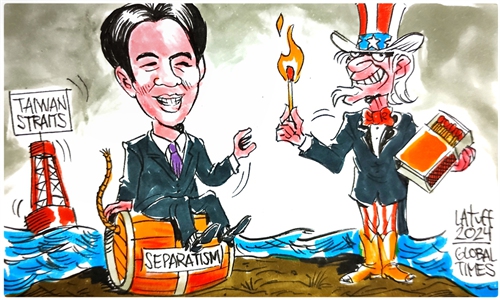Future of China-US ties lies in effective management of common interests and differences

China US. Photo: GT
This year marks the 45th anniversary of establishing diplomatic relations between China and the US. Today, China and the US have formed a situation of important common interests. However, due to differences in history, social systems, economic levels and development paths, there are disputes between China and the US in many aspects. If these differences are not effectively managed, conflict may follow.
Differences between China and the US will always exist, so the two countries should seek common ground in major aspects and allow differences to exist in other aspects. The "table and menu" theory is a typical cold war mentality. According to this theory, in the international system, major, wealthy and powerful countries are diners at the table, while small, poor and weak countries can only be items on the menu, to be slaughtered and consumed. China has always advocated that all sovereign states in the world should be equal, and treated as such.
A common ground refers to the common interests, challenges, and the responsibility of defending the fundamental interests of one's own country and maintaining world peace and stability between China and the US. China has always hoped that China and the US can be partners, committed to building a stable, healthy and sustainable relationship. At the same time, China has interests that must be maintained and principles that must be defended.
Two sides should sincerely implement the important consensus reached by the leaders of China and the US. The Chinese government and the Chinese people attach great importance to and cherish the China-US relationship. The China-US relationship is the most important bilateral relationship in the world, and how the two countries get along will determine the future of humanity and the planet. Since Joe Biden took office as President of the US, the two countries have had multiple meetings, reaching many consensuses on major strategic issues. President Biden reiterated that the US does not seek a new cold war, to change China's system, or revitalize its alliance against China. Moreover, the US does not support "Taiwan independence." This should be the fundamental principle and basic guideline that China and the US must adhere to in effectively managing differences and enhancing military security.
Since the 1970s, China and the US have reached consensus and made commitments on many major issues. Therefore, actions must be taken to implement these commitments, rather than being insincere, even forming cliques, and losing credibility. It is important to turn the "San Francisco vision" into reality, stabilize and improve China-US relations, and do more for world peace and stability.
Strengthening the risk management of core interests and major areas is also essential. China and the US must effectively manage their differences together. Differences should not become a chasm between the two countries, but rather a bridge to be built. Both sides should understand each other's bottom lines, engage in more dialogue and calmly handle unexpected events. Most importantly, risks related to China's core interests must be effectively managed, such as the Taiwan question, the South China Sea issue and the East China Sea issue, and strictly controlling risks related to the development of nuclear forces and the application of AI in the military. The former is China's bottom line that cannot be crossed, and the latter concerns the life and death of humanity and the survival of the planet.
Finally, the two major countries should establish effective mechanisms for managing differences. In recent years, China and the US have established some military risk management approaches, such as the China-US defense ministry working level meeting, which have played a certain role in managing differences and risks and preventing armed conflicts. However, conflicts are difficult to avoid, mainly because the important consensus reached by the leaders of the two countries has not been effectively implemented. At the same time, specific rules for effectively managing differences and risks should be negotiated and established in some important areas, such as the use of weapons of mass destruction and the application of AI in the military.
"The relationship cannot go back to the old days, but it can embrace a brighter future." This requires sincere efforts and mutual cooperation from both China and the US. We are full of confidence and expectations for this.
The author is PLA Lieutenant General and former vice president of the Academy of Military Sciences of the PLA. opinion@globaltimes.com.cn



